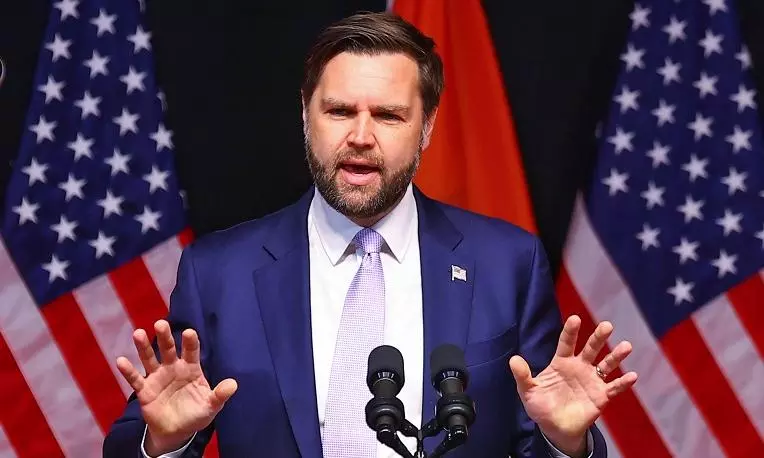
India-Pak war tensions none of our business: US Vice President JD Vance
While the US cannot control India and Pakistan, it can encourage the two nuclear-armed neighbours to de-escalate, Vice President J D Vance said in an interview

Amid rising tensions between India and Pakistan, the United States has firmly stated it will not intervene in a conflict that is “fundamentally none of our business.”
Speaking to Fox News on Thursday (8 May), US Vice President J D Vance emphasised that while the US cannot control India and Pakistan, it will continue to encourage the two nuclear-armed neighbours to de-escalate.
“We are concerned any time nuclear powers collide and have a major conflict,” Vance said, when asked about the Trump administration’s concerns over a potential nuclear war between India and Pakistan.
Vance quoted US President Donald Trump and Secretary of State Marco Rubio who have said that Washington wants the tensions to "de-escalate" as quickly as possible.
Also Read: As missiles roar across border, fake news flies thick and fast on social media
Limits of influence
Vice President Vance was clear about America’s limits: “We cannot control these countries. India has its grievances with Pakistan, and Pakistan has responded. What we can do is encourage them to to de-escalate, but w we're not going to get involved in a war that has nothing to do with America’s ability to control it.”
He added, “We cannot tell the Indians to lay down their arms, nor the Pakistanis. We're going to continue to pursue our efforts to de-escalate tensions through diplomatic channels. We hope, and expect, that this situation will not spiral into a broader regional conflict or, God forbid, a nuclear war. Of course, we are worried, but right now we do not believe that will happen.”
He also added that it is the job of the diplomats and peace mongers in India and Pakistan is to make sure this conflict doesn't become a nuclear war.
Also Read: India bans all Pakistani content, including web series, films, songs, podcasts
Pahalgam attack repercussions
Vance, accompanied by Second Lady Usha Vance and their three children, was on their first official visit to India when a terrorist attack in Pahalgam, Jammu and Kashmir, on 22 April, killed 26 people, mostly tourists.
In the wake of the attack, India launched Operation Sindoor on Wednesday (May 7), targeting terror infrastructure across Pakistan and Pakistan-occupied Kashmir.
On Thursday (May 8) night, the Indian military intercepted and neutralised Pakistani attempts to strike military bases in Jammu, Pathankot, Udhampur, and other areas with missiles and drones, as tensions soared between the two countries amid growing fears of a wider military conflict.
India’s defence ministry declared that the country remains “fully prepared to defend its sovereignty and ensure the safety of its people.”
Also Read: Operation Sindoor: 15 Indian cities Pakistan tried to attack
Diplomatic outreach
Earlier on Thursday (May 8), Secretary of State Marco Rubio spoke separately with India’s External Affairs Minister S Jaishankar and Pakistani Prime Minister Shehbaz Sharif, underlining the need for immediate de-escalation.
In his conversation with Jaishankar, Rubio conveyed US support for direct India-Pakistan dialogue and encouraged continued efforts to improve communications.
He reiterated Washington’s condolences for the horrific terrorist attack in Pahalgam and reaffirmed America’s commitment to work alongside India in combating terrorism.
During his call with Sharif, Rubio reiterated his calls that Pakistan take meaningful steps to eliminate any support for terrorist organisations.
Also Read: Operation Sindoor aligns with UNSC call against terrorism, says India
Focus on diplomacy
At a press briefing on Thursday, State Department Spokesperson Tammy Bruce said Rubio had made it clear to both Jaishankar and Sharif the need for de-escalate the ongoing tensions.
She said that “the back-and-forth continuation' of military operations between the two countries should stop.
She stressed that the message from the Secretary of State and from the United States is that military action and violence are not solutions, noting that decades of conflict in South Asia and the Middle East have shown that war rarely leads to lasting peace.
“This administration administration has made itself clear: war, the military, more violence is not the solution. Diplomacy is the answer; new approaches are needed to end generational violence,” Bruce stated.
When asked whether Rubio had offered to mediate between the two countries, she replied, “We are not going to speak about the details. That is certainly our policy.”
Also Read: Operation Sindoor: Why the name, and 'using' Col Qureshi, is problematic
Continued engagement
Bruce reaffirmed that the US remains actively engaged with both India and Pakistan at multiple levels, urging the two nations to pursue a responsible resolution.
She added that the US wants the perpetrators of the Pahalgam terror attack to be held accountable. Bruce told reporters that Rubio underlined that the conflict should not escalate.
"This has been an issue for decades. What we saw in the last few weeks after the terror attack was not surprising but extremely disappointing. Communication is the key, there should be talks and not silence," Bruce said.
Over the last two days, America has been at the centre of diplomatic conversations with leaders from both countries, she said.
(With inputs from agencies)

